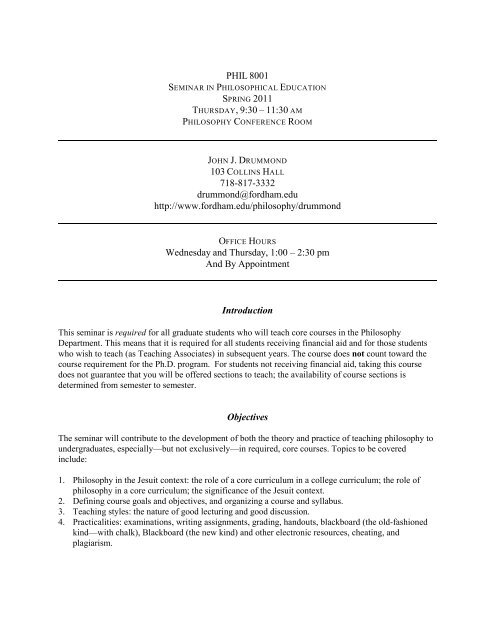seminar in philosophical education - Fordham University Faculty
seminar in philosophical education - Fordham University Faculty
seminar in philosophical education - Fordham University Faculty
You also want an ePaper? Increase the reach of your titles
YUMPU automatically turns print PDFs into web optimized ePapers that Google loves.
PHIL 8001SEMINAR IN PHILOSOPHICAL EDUCATIONSPRING 2011THURSDAY, 9:30 – 11:30 AMPHILOSOPHY CONFERENCE ROOMJOHN J. DRUMMOND103 COLLINS HALL718-817-3332drummond@fordham.eduhttp://www.fordham.edu/philosophy/drummondOFFICE HOURSWednesday and Thursday, 1:00 – 2:30 pmAnd By Appo<strong>in</strong>tmentIntroductionThis <strong>sem<strong>in</strong>ar</strong> is required for all graduate students who will teach core courses <strong>in</strong> the PhilosophyDepartment. This means that it is required for all students receiv<strong>in</strong>g f<strong>in</strong>ancial aid and for those studentswho wish to teach (as Teach<strong>in</strong>g Associates) <strong>in</strong> subsequent years. The course does not count toward thecourse requirement for the Ph.D. program. For students not receiv<strong>in</strong>g f<strong>in</strong>ancial aid, tak<strong>in</strong>g this coursedoes not guarantee that you will be offered sections to teach; the availability of course sections isdeterm<strong>in</strong>ed from semester to semester.ObjectivesThe <strong>sem<strong>in</strong>ar</strong> will contribute to the development of both the theory and practice of teach<strong>in</strong>g philosophy toundergraduates, especially—but not exclusively—<strong>in</strong> required, core courses. Topics to be covered<strong>in</strong>clude:1. Philosophy <strong>in</strong> the Jesuit context: the role of a core curriculum <strong>in</strong> a college curriculum; the role ofphilosophy <strong>in</strong> a core curriculum; the significance of the Jesuit context.2. Def<strong>in</strong><strong>in</strong>g course goals and objectives, and organiz<strong>in</strong>g a course and syllabus.3. Teach<strong>in</strong>g styles: the nature of good lectur<strong>in</strong>g and good discussion.4. Practicalities: exam<strong>in</strong>ations, writ<strong>in</strong>g assignments, grad<strong>in</strong>g, handouts, blackboard (the old-fashionedk<strong>in</strong>d—with chalk), Blackboard (the new k<strong>in</strong>d) and other electronic resources, cheat<strong>in</strong>g, andplagiarism.
The <strong>sem<strong>in</strong>ar</strong> will also <strong>in</strong>volve some more immediately practical results, most notably:1. The preparation of actual syllabuses for our two core courses (Philosophy of Human Nature andPhilosophical Ethics).2. Discussions of teach<strong>in</strong>g particular core texts.TextsBr<strong>in</strong>kley, Alan et al. 1999. The Chicago Handbook for Teachers: A Practical Guide to the Classroom.Chicago: The <strong>University</strong> of Chicago Press. ISBN: 0226075125. Abbreviated CHT <strong>in</strong> the syllabus.McKeachie, Wilbert J. et al. 2006. McKeachie’s Teach<strong>in</strong>g Tips: Strategies, Research, and Theory forthCollege and <strong>University</strong> Teachers, 12 ed. (Boston: Houghton Miffl<strong>in</strong>, 2005). ISBN: 0618515569.Abbreviated TT <strong>in</strong> the syllabus.SyllabusJanuary 20: Organization and IntroductionJanuary 27: Philosophy <strong>in</strong> the Jesuit <strong>University</strong>Read<strong>in</strong>g: <strong>Fordham</strong> <strong>University</strong> Mission Statementhttp://www.fordham.edu/discover_fordham/mission_26603.asp<strong>Fordham</strong>’s Jesuit Traditionhttp://www.fordham.edu/discover_fordham/fordhams_jesuit_trad/Ignatian Heritagehttp://www.fordham.edu/mission/mission_and_m<strong>in</strong>istry/ignatian_heritage/<strong>in</strong>dex.aspnd“Our Mission Today,” Decree 4 of the 32 General Congregation of theSociety of Jesus (selections) (handout)Service Learn<strong>in</strong>ghttp://69.7.74.46/section8/section87/section95/<strong>Fordham</strong> at a Glance, <strong>in</strong>clud<strong>in</strong>g all subpages (website)http://www.fordham.edu/discover_fordham/facts_26604.asphttp://69.7.74.46/section3/<strong>in</strong>dex.htmlAcademic Programs, Policies and Procedures: Core Curriculum, 2013 andbeyondhttp://69.7.74.46/section8/section85/<strong>in</strong>dex.htmlhttp://69.7.74.46/section8/section85/section1696/<strong>in</strong>dex.htmlStudent Attendancehttp://69.7.74.46/section8/section97/section109/<strong>in</strong>dex.htmlPreparation of the Syllabus (handout)February 3: The Virtues of the TeacherRead<strong>in</strong>g: TT, pp. 300–341; CHT, 117–42February 10: An Old-Hands Discussion (guest panel of current and former teach<strong>in</strong>g fellows).Read<strong>in</strong>g: TT, pp. 344–59.
February 17: Before You Start: Def<strong>in</strong><strong>in</strong>g Objectives and Construct<strong>in</strong>g a SyllabusRead<strong>in</strong>g: TT, pp. 9–20; CHT, pp. 1–16.Assignment: Prepare a statement of objectives for “Philosophy of Human Nature” andone for “Philosophical Ethics”February 24: Start<strong>in</strong>g: The First Day and Weeks of ClassRead<strong>in</strong>g: TT, pp. 21–28; CHT, pp. 17–31.March 3: Teach<strong>in</strong>g Styles: DiscussionRead<strong>in</strong>g: TT, pp. 30–56, 213–28, 300–324 (review); CHT, pp. 33–49.March 10: Teach<strong>in</strong>g Styles: LectureRead<strong>in</strong>g: TT, pp. 57–73, 172–90, CHT; pp. 51–64.March 17: SPRING BREAK; no class. Happy St. Patrick’s Day! Don’t dr<strong>in</strong>k green beer; it’s noteco-friendly!March 24: TechnologyRead<strong>in</strong>g: TT, pp. 229–52; CHT, pp. 143–67; Blackboard Support (handout).Assignment: Reaction paper: focus on either some claim(s) or some example(s) found <strong>in</strong>the read<strong>in</strong>gs to date and write a 1200 to 1500 word paper detail<strong>in</strong>g your (reasoned!)agreement or disagreement with the po<strong>in</strong>t of the claim(s) or example(s) <strong>in</strong> relation tothe teach<strong>in</strong>g of philosophy.March 31: Exam<strong>in</strong>ations and PapersRead<strong>in</strong>g: TT, pp. 192–212; CHT, pp. 65–84.April 7: Test<strong>in</strong>g and EvaluationRead<strong>in</strong>g: TT, pp. 74–112, 123–38; CHT, pp. 85–99, 101–16.Assignment: Draft of syllabuses presented onl<strong>in</strong>e to all members of the class.April 14: Teach<strong>in</strong>g TextsAssignment: Comments on <strong>in</strong>dividual syllabuses onl<strong>in</strong>e to each member of the class(except yourself, of course) and on all syllabuses to <strong>in</strong>structor.April 21: EASTER BREAK; no classApril 28: Cheat<strong>in</strong>g and Plagiarism (with Professor Grontkowski)Read<strong>in</strong>g: <strong>Fordham</strong> Arts and Sciences Policy on Academic Integrity (handout).May 5: Teach<strong>in</strong>g TextsMay 12: Teach<strong>in</strong>g TextsAssignment: F<strong>in</strong>al syllabuses and one set of writ<strong>in</strong>g-assignment directions for eachsyllabus.Requirements1. Class participation and discussion; the class will be a discussion-oriented, collaborative th<strong>in</strong>k<strong>in</strong>gabout teach<strong>in</strong>g. Class participation is essential; 40% of grade.2. Statements of objectives for both “Philosophy of Human Nature” and “Philosophical Ethics”; due
February 17; 5% of grade3. Reaction paper due March 24. See assignment for that day for details; 10% of grade.4. Draft syllabuses for both “Philosophy of Human Nature” and “Philosophical Ethics”; they should besubmitted to the Blackboard site as a Microsoft Word or PDF attachment and filed <strong>in</strong> the discussionforum with your name. These are due April 7.5. Comments on each class member’s syllabuses; these comments should <strong>in</strong>clude remarks about whatyou take to be both the positives and negatives of the syllabus and can be from the perspective ofeither a fellow <strong>in</strong>structor or a student <strong>in</strong> the class. They should be filed as a simple forum message oras a Word or PDF attachment <strong>in</strong> the forum bear<strong>in</strong>g the name of the student on whose syllabus you arecomment<strong>in</strong>g. They are due on April 14; 5% of grade.6. “Teach<strong>in</strong>g texts” presentation; You will choose a passage to teach to the rest of the class (or todiscuss how you would teach it), and you should preface your treatment of the passage with adiscussion of how you would locate this passage <strong>in</strong> the larger context of the work and the course;20% of grade.7. F<strong>in</strong>al syllabuses accompanied (either as part of the syllabus or on a separate sheet) by one detailedwrit<strong>in</strong>g assignment sheet for each syllabus. They should be submitted to your Blackboard forum asWord or PDF documents no later than May 12; 20% of grade.
















